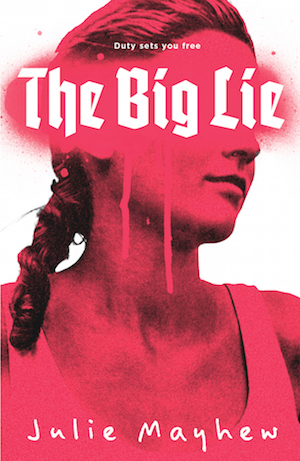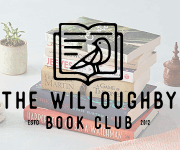Disclosure: I received a finished copy of the book from Pansing Books, a regional distributor, in exchange for an honest review. This does not affect my opinion of the book or the content of my review.
 The Big Lie by Julie Mayhew • contains 323 pages • published August 27, 2015 by Hot Key Books • classified as Alternate History, Dystopian, LGBTQ, Young Adult • obtained through Pansing Books • read as paperback • shelve on Goodreads
The Big Lie by Julie Mayhew • contains 323 pages • published August 27, 2015 by Hot Key Books • classified as Alternate History, Dystopian, LGBTQ, Young Adult • obtained through Pansing Books • read as paperback • shelve on Goodreads Synopsis:
A startling coming-of-age novel set in a contemporary Nazi England.
Jessika Keller is a good girl. A champion skater, model student of the Bund Deutscher Mädel and dutiful daughter of the Greater German Reich. Her best friend Clementine is not so submissive. Passionately different, Clem is outspoken, dangerous, radical. And the regime has noticed.
Jess cannot keep both her perfect life and her dearest friend, her first love. But which can she live without?
The Big Lie is a thought-provoking and beautifully told story that explores ideas of loyalty, sexuality, protest and belief.
Set in Nazi England, 2012–2014, The Big Lie is premised on one question: What if the Nazis had won World War II? With this in mind, The Big Lie is a speculative work of alternative history. While nobody can say for sure how things would’ve turned out, I think the world that Julie Mayhew imagined is a rather plausible outcome. She evidently did her research and wove together the fascist ideals and lifestyles of the 1940s with contemporary ones.
History in the Present
I was impressed with the world contained in The Big Lie. It felt like it was stuck in the past, which made sense because they were cut off from the rest of the earth. Yet there were glimpses of technological progress, though IT machines had mostly been banned. The mentions of laptops, the Internet and even VPN (by inaugural American visitors to England), set everything squarely in our contemporary times.
One important yet terrifying aspect of The Big Lie was eugenics. The state was very much concerned with Hitler’s vision to advance the perfect human race. Sterilisation was a cure to prevent unwanted people from procreation. Homosexuality was treated like a disease to be medically treated. Every parent wanted their child to marry someone of respectable breed.
Questioning Nazi Rule
Kristen devoted a lot of her attention to Clementine. Clementine who opposed the authoritarian rule. She believed that the world was bigger than they knew. When Kristen was on her way to become the best figure skater, Clementine put her in her place — they didn’t know if Kristen was any better than the figure skaters outside of the German Empire.
While Clementine insisted that they were oppressed, Kristen believed in her family, in her leaders and in her upbringing. She believed that her life was good. She didn’t recognize that her freedom was curtailed until she realized that neither she nor Clementine could be themselves. Kristen wasn’t free to love whoever she wanted to. Clementine wasn’t free to explore the world.
Seeds of Doubt
The transition Kristen underwent in The Big Lie was very well-developed. She started off as a very naïve girl. She believed everything her father told her. She allowed her mother to put her in her place. It didn’t matter if she didn’t agree. Her parents were right. Clementine’s father, she believed was a thief who came to possess a worrying array of contraband. Clementine’s mother was crazy for lashing out at Nazi supporters.
But Clementine, oh, sweet Clementine? She had Kristen’s affections. This allowed Clementine to plant the seeds of doubt that grew as Kristen realized she didn’t fit in the mould that she was meant to. Her duty to be a role model to the younger girls, to grow up and marry and bear children didn’t appeal to her. She wanted to pursue her goals and her desires.
Favourite Elements in The Big Lie
The Big Lie addresses the question, What if? extremely well. It put so many things into perspective. They weren’t necessarily confined to a Nazi state either. Concerns of freedom of speech, homosexuality, feminism and politics might have been embedded in an alternate history but they matter in reality. It’s when they’re undermined to the extreme though that we recognize the importance of these and that’s why The Big Lie shone so much for me.
The only reason I didn’t love The Big Lie whole-heartedly was that it would’ve benefitted from a little more depth. Occasionally I thought Kristen’s thoughts fell a little flat. In an attempt for breadth, depth was neglected a fair bit. Aside from that, it’s a more than worthy read!

[…] underrated reads, quirky book covers, very original stories, etc. This theme made me thing of The Big Lie by Julie Mayhew because of its genre, which is alternate history. Through the book the reader’s then to times […]